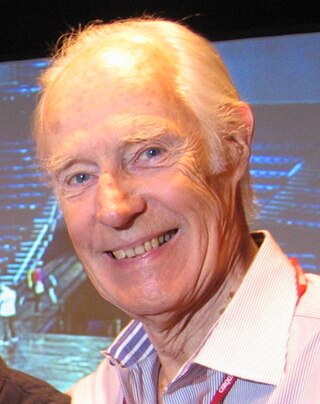
Sir George Henry Martin was an English record producer, arranger, composer, conductor, and musician. He was commonly referred to as the "Fifth Beatle" because of his extensive involvement in each of the Beatles' original albums. Martin's formal musical expertise and interest in novel recording practices facilitated the group's rudimentary musical education and desire for new musical sounds to record. Most of their orchestral arrangements and instrumentation were written or performed by Martin, and he played piano or keyboards on a number of their records. Their collaborations resulted in popular, highly acclaimed records with innovative sounds, such as the 1967 album Sgt. Pepper's Lonely Hearts Club Band—the first rock album to win a Grammy Award for Album of the Year.
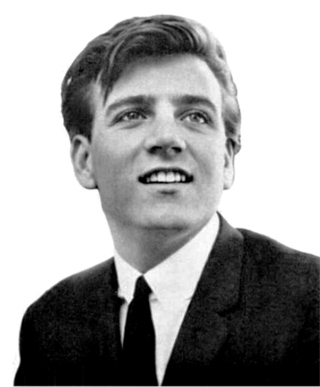
William Howard Ashton, known professionally as Billy J. Kramer, is an English pop singer. With The Dakotas, Kramer was managed by Brian Epstein during the 1960s and scored hits with several Lennon–McCartney compositions never recorded by the Beatles, among them the UK number one "Bad to Me" (1963). Kramer and the Dakotas had a further UK chart-topper in 1964 with "Little Children" and achieved U.S. success as part of the British Invasion. Since the end of the beat boom, Kramer has continued to record and perform. His autobiography, Do You Want to Know a Secret, was published in 2016.

"From Me to You" is a song by the English rock band the Beatles that was released in April 1963 as their third single. It was written by John Lennon and Paul McCartney. The song was the Beatles' first number 1 hit on what became the official UK singles chart but the second, after "Please Please Me", on most of the other singles charts published in the UK at the time. "From Me to You" failed to make an impact in the United States at the time of its initial release. Instead, a 1963 cover version released by Del Shannon resulted in the song's becoming the first Lennon–McCartney track to enter the US pop charts. The Beatles' original was rereleased in the US in January 1964 as the B-side to "Please Please Me", and reached number 41.
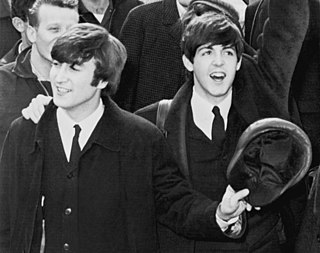
Lennon–McCartney was the songwriting partnership between English musicians John Lennon (1940–1980) and Paul McCartney (1942-) of the Beatles. It is widely considered one of the greatest, best known and most successful musical collaborations ever by records sold, with the Beatles selling over 600 million records worldwide as of 2004. Between 5 October 1962 and 8 May 1970, the partnership published approximately 180 jointly credited songs, of which the vast majority were recorded by the Beatles, forming the bulk of their catalogue.

"Too Many People" is a song by Paul McCartney and his wife Linda McCartney, from the 1971 album Ram. The song was issued as the B-side of the "Uncle Albert/Admiral Halsey" single, and was also included on The 7" Singles Box in 2022.
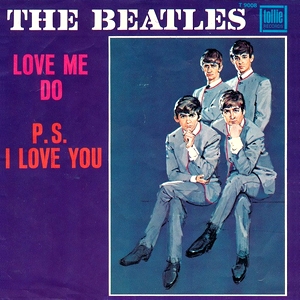
"Love Me Do" is the debut single by the English rock band the Beatles, backed by "P.S. I Love You". When the single was originally released in the United Kingdom on 5 October 1962, it peaked at number 17. It was released in the United States in 1964 and topped the nation's song chart. Re-released in 1982 as part of EMI's Beatles 20th anniversary, it re-entered the UK charts and peaked at number 4. "Love Me Do" also topped the charts in Australia and New Zealand.

"Thank You Girl" is a song recorded by the English rock band the Beatles, written by John Lennon and Paul McCartney. It was issued as the B-side of the single "From Me to You", which was recorded on the same day. While not released on an LP in the United Kingdom until Rarities in 1978, the song was the second track on The Beatles' Second Album in the United States. As the B-side of the single "Do You Want to Know a Secret", it hit No. 35 on the Billboard Hot 100 in the spring of 1964.

"Tell Me What You See" is a song by the English rock band the Beatles that first appeared in 1965 on their album Help! in the United Kingdom and on Beatles VI in the United States. The song is credited to Lennon–McCartney but mainly written by Paul McCartney. Regarding the song's authorship, McCartney said, "I seem to remember it as mine. I would claim it as a 60–40 but it might have been totally me." John Lennon said, in his interviews with Playboy (1980) and Hit Parader (1972), that "Tell Me What You See" was written completely by McCartney.
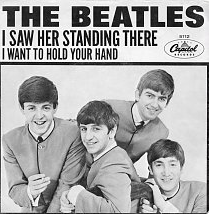
"I Saw Her Standing There" is a song by the English rock band the Beatles, written by Paul McCartney and John Lennon. It is the opening track on the band's 1963 debut UK album Please Please Me and their debut US album Introducing... The Beatles.

"Ask Me Why" is a song by the English rock band the Beatles originally released in the United Kingdom as the B-side of their single "Please Please Me". It was also included on their 1963 debut album Please Please Me. It was written primarily by John Lennon and credited to the Lennon–McCartney partnership.

"P.S. I Love You" is a song recorded by English rock band the Beatles in 1962. It was composed principally by Paul McCartney, and produced by Ron Richards. The song was released in the UK on 5 October 1962 as the B-side of their debut single "Love Me Do" and is also included on their debut album Please Please Me (1963). It was later included on the American release Introducing... The Beatles (1964), its reissue The Early Beatles (1965), and the Beatles compilation album Love Songs (1977).

"Do You Want to Know a Secret" is a song by English rock band the Beatles from their 1963 album Please Please Me, sung by George Harrison. In the United States, it was the first top ten song to feature Harrison as a lead singer, reaching No. 2 on the Billboard chart in 1964 as a single released by Vee-Jay, VJ 587. In the UK, Billy J. Kramer released a cover of the song as his debut single, reaching No. 1 on the NME singles chart and No. 2 on the Record Retailer chart.
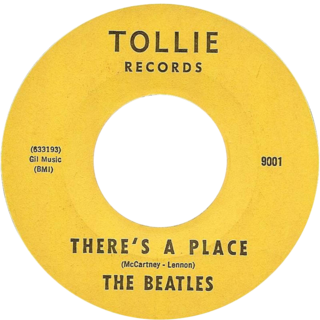
"There's a Place" is a song by the English rock band the Beatles from their debut album, Please Please Me, released in March 1963. It was written primarily by John Lennon and credited to McCartney–Lennon. In the United States, the song was released in July 1963 on the group's first US LP, Introducing... The Beatles, later reissued in January 1964 as Beatlemania surged there. It was also issued as a non-album single in the US, in March 1964, as the B-side to "Twist and Shout", reaching number 74 in the Billboard Hot 100.
Northern Songs Ltd was a limited company founded in 1963, by music publisher Dick James, artist manager Brian Epstein, and songwriters John Lennon and Paul McCartney of the Beatles, to publish songs written by Lennon and McCartney. In 1965, it was decided to make Northern Songs a public company, to reduce their income tax burden.
"I'll Be on My Way" is a song written by Paul McCartney, credited to Lennon–McCartney, first released on 26 April 1963 by Billy J. Kramer with the Dakotas as the B-side of their hit debut single "Do You Want to Know a Secret", a song also written by Lennon–McCartney. The single reached number two in the UK charts while "From Me to You" by the Beatles occupied the number 1 position. The Beatles recorded a version of the song on 4 April 1963 for BBC radio, first released on the 1994 compilation album Live at the BBC.
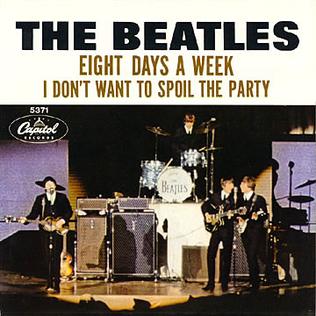
"Eight Days a Week" is a song by the English rock band the Beatles. It was written by Paul McCartney and John Lennon based on McCartney's original idea. The song was released in the United Kingdom in December 1964 on the album Beatles for Sale. In the United States, it was first issued as a single in February 1965 before appearing on the North American release Beatles VI. The song was the band's seventh number 1 single on the Billboard Hot 100, a run of US chart success achieved in just over a year. The single was also number 1 in Canada, Belgium and the Netherlands.
David Spinozza is an American guitarist and producer. He worked with former Beatles Paul McCartney, Ringo Starr and John Lennon during the 1970s, and had a long collaboration with singer-songwriter James Taylor, producing Taylor's album Walking Man.
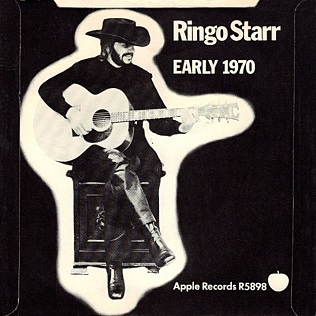
"Early 1970" is a song by English rock musician Ringo Starr that was released as the B-side of his April 1971 single "It Don't Come Easy". A rare example of Starr's songwriting at the time, it was inspired by the break-up of the Beatles and documents his relationship with his three former bandmates. The lyrics to the verses comment in turn on Paul McCartney, John Lennon and George Harrison as individuals, and the likelihood of each of them making music with Starr again. In the final verse, Starr offers a self-deprecating picture of his musical abilities and expresses the hope that all four will play together in the future. Commentators have variously described "Early 1970" as "a rough draft of a peace treaty" and "a disarming open letter" from Starr to Lennon, McCartney and Harrison.

Amoeba's Secret is an EP by Paul McCartney recorded during a secret performance at Amoeba Music in Hollywood, California, on 27 June 2007.
"Little Lamb Dragonfly" is a song by Paul McCartney and Wings, composed by Paul and Linda McCartney and originally released on the 1973 album Red Rose Speedway. The song was originally recorded during the sessions for McCartney's Ram album in early 1971, and thus Hugh McCracken plays guitar on the recording rather than Wings' guitarist Denny Laine. However, Laine did provide backing vocals during the production work for Red Rose Speedway. McCartney originally intended to use the song as part of his Rupert and the Frog Song animated film project. Chip Madinger and Mark Easter noted that drummer Denny Seiwell may have assisted in writing the song, although he was not credited.












